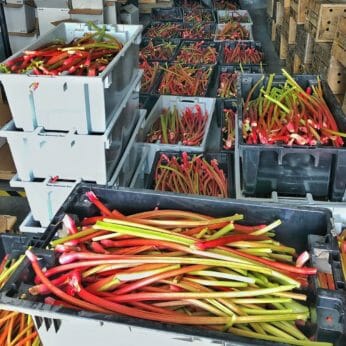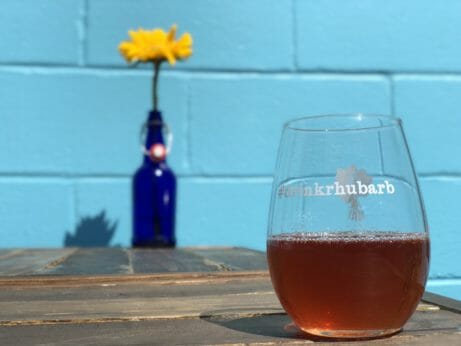Is Rhubarb Wine the New Rosé? This Maine-Based Winemaker Thinks It Just Might Be
Amanda O’Brien of eighteen twenty wines in Portland, Maine, shares how she came to help one of New England’s hottest wineries.
Is Rhubarb Wine the New Rosé? This Maine-Based Winemaker Thinks It Just Might Be
Amanda O’Brien of eighteen twenty wines in Portland, Maine, shares how she came to help one of New England’s hottest wineries.

We caught 39-year-old winemaker and owner Amanda O’Brien of eighteen twenty wines (1820 is the year Maine became a state) on the ferry home to her native Peaks Island, just off the coast of downtown Portland, earlier this month to chat more about why people should #DrinkRhubarb:
MF: How did a marketing executive and Islander from Maine end up as a winemaker?
Ever since I could start working, I’ve always worked in hospitality, restaurants, and marketing. I love wine and cocktails and cocktail design. A few years ago, wearing my marketing hat, I started working with a company in Burgundy, which gave me the opportunity to drink the best wines in the world, but I also realized that this renown region is really just a bunch of farmers who care deeply about what they produce – that was a huge a-ha moment for me. Around that time, my friend brought up in conversation that he’d been making rhubarb wine at home, and I had the same reaction as everyone: that doesn’t sound good. But rhubarb grows really well in Maine, it likes Maine winters, it comes up early in the spring, and it’s easy for farmers to grow.
MF: And that’s how eighteen twenty was born?
My friend who was making the rhubarb wine wanted to bring it to market, so we worked together to figure out how. We started scoping out commercial spaces, then I opened the production facility and tasting room. Now, I’m just trying to grow the production to meet the demand, It’s a good problem to have, but it still causes some sleepless nights.

MF: Tell us about your product.
Our wines are Rha, the flagship dry and slightly acidic rhubarb wine, Honeoye, a rhubarb-strawberry wine that’s dry and tart, and Wintrus, a dry and complex rhubarb wine aged for six months in cabernet barrels. Our two ciders are Ohm, a dry English-style cider made with Maine “eating and cooking” apples, and Ohm’s Law, that same cider aged in cinnamon whiskey barrels to give it a little more complexity and kick.
MF: Why rhubarb?
Rhubarb is a low-maintenance crop It’s also a spring crop, the first to come up, so what I’ve heard from the farmers I work with is that it’s a really great time and crop for them, it grows off to the side and harvests in a “shoulder season” between investing in the summer and the fall harvests. The motivation now is getting more farmers growing rhubarb – and getting more rhubarb at the farms we’re currently working with.
MF: How do you fit into the hundreds-of-years-old tradition of New England fruit wines?
Rhubarb wine was a big thing in the 1800s: historically, when farmers had less overcrop, they would pickle or ferment what they had left – and anyone who has rhubarb has too much rhubarb. In the 1860s in particular, rhubarb wine was cool, it was a thing, and we’re going to make it cool again. During Prohibition, New Englanders were still making rhubarb wine “for medicinal purposes”. Rhubarb wine tastes a lot like rosé, and has a great yield: one pound of rhubarb equals one bottle of wine. Rhubarb is also just a dollar or two a pound wholesale, much more economical than wine grapes, or even other edible summer/fall fruits.
The criticism and stereotype with many fruit wines is that they slap you in the face with the blueberry or strawberry or whatever. But rhubarb is pretty subtle. Even wine sommeliers try it and can’t figure it out, and that’s a great compliment. I’m never going to convince a wine snob or wine judge to think of our wine the way that they would one from Burgundy, but thanks to the craft beer movement, people are more adventurous with what they’re trying. Rhubarb wine could pretty easily become the next rosé.
MR: What’s the production process like?
Most people don’t know that there are 60 different strains of rhubarb, and I want to test the qualities of each one that I can get my hands on. What’s the difference in the sugar content, the acidity levels, etc.? Everyone immediately thinks of the pink and green rhubarb, but there are other heirloom varieties that are more wiry, or more green. Wine is made from hundreds of different wine grape wines to make different varietals, so why can’t we do that with rhubarb? Two of the ones I’m looking at right now are Crimson Red and Victoria, and then I’m excited to play with the names. I also want to find out: Is there a terroir in Maine? Grapes are more delicate, so maybe they take on more of that then rhubarb, but no one knows. Yet. I’m working with the testing facility at the University of Maine that will help me test different rhubarbs and areas and see which additional small-production or single-crop wines we can do in the future.

MF: Where do you get your rhubarb from? What’s your relationship like with farmers?
My rhubarb comes from Dole’s Orchard in Limington, Maine, and Spiller Farm in Wells, Maine. They’re both providing rhubarb and strawberries. My apples for the hard ciders are also coming from them, and we use commercial winemaking yeast, nothing too crazy. We have a third farm that we bought rhubarb from this year in Carmel, Maine, and there are two other local farms I’m hoping to add for next year.
MF: What does a “year in the life” at eighteen twenty look like? What are your seasons?
The idea is to get ahead of the calendar: right now, I’m behind because we’ve sold out, and I can’t get more rhubarb until May, and then it takes me at least six weeks to ferment, which puts me in August. But then we’ll have product for the holidays. What sets me apart from most wineries is that I’m working with actual produce, not juice. All of my production and fermentation happens in the production facility, which is also our tasting room. Rhubarb comes in, we wash it, cut it, and prepare it to be frozen at a place in Portland that’s traditionally only been used by fisherman, and then there’s me with my 1,000 pounds of rhubarb, freezing it before pressing to break down its fiber and sugars. Then we press it with an apple press, add the yeast, a few tears, and make wine.
“Thanks to the craft beer movement, people are more adventurous with what they’re trying.”
MF: Tell us about your new taproom.
We’re in a really cool area of Portland called East Bayside, also affectionately known as “Yeast Bayside” because we’re in a walkable cluster of breweries and wineries, which is awesome because it’s easier to get people to visit us. The Maine Brewbus brings people to us every weekend on their Not Your Average Wine Tours. In the summer, we’re making wine spritzers: something light and refreshing that you can drink outside while you watch the sunset. We have different food trucks that set up shop, there’s a marshmallow cart comes once a month with 20 different kinds of marshmallows and graham crackers and we’ll do s’mores pairings with the wines and ciders. Those are really fun and going really well, it’s great to have another local entrepreneur to collaborate with. My wine is a really dry wine, so a fatty and stick-in-your-mouth sugar pairs really well – we did a candied maple bacon marshmallow pairing recently that was super awesome.
MF: What else does the future hold for eighteen twenty and rhubarb wine?
At the end of August, we’re releasing our fourth rhubarb wine, Dottie Mae, a wild-fermented and slightly sweeter wine. It’s named after my grandmother, Dot Flynn, who was sweet, kind, and a strong, female role model. She once snuck out of her house to go ice skating and broke her knee…in her 60s. She bucked the system to become one of the first female mail carriers. She spiked her Tab with whiskey. She was a legend.
MF: Any advice for aspiring local winemakers, brewers, or rhubarb-product-makers?
The same advice I have for most things: You just have to try some stuff. Don’t get paralyzed by the should I/could I, just do it. Everyone is doing it differently, find your way.
To find out more about how to visit and where to buy Maine rhubarb wines and ciders, visit the eighteen twenty website or follow them on Instagram and Facebook.
Follow us
This work is licensed under a Creative Commons Attribution-NoDerivatives 4.0 International License.
Want to republish a Modern Farmer story?
We are happy for Modern Farmer stories to be shared, and encourage you to republish our articles for your audience. When doing so, we ask that you follow these guidelines:
Please credit us and our writers
For the author byline, please use “Author Name, Modern Farmer.” At the top of our stories, if on the web, please include this text and link: “This story was originally published by Modern Farmer.”
Please make sure to include a link back to either our home page or the article URL.
At the bottom of the story, please include the following text:
“Modern Farmer is a nonprofit initiative dedicated to raising awareness and catalyzing action at the intersection of food, agriculture, and society. Read more at <link>Modern Farmer</link>.”
Use our widget
We’d like to be able to track our stories, so we ask that if you republish our content, you do so using our widget (located on the left hand side of the article). The HTML code has a built-in tracker that tells us the data and domain where the story was published, as well as view counts.
Check the image requirements
It’s your responsibility to confirm you're licensed to republish images in our articles. Some images, such as those from commercial providers, don't allow their images to be republished without permission or payment. Copyright terms are generally listed in the image caption and attribution. You are welcome to omit our images or substitute with your own. Charts and interactive graphics follow the same rules.
Don’t change too much. Or, ask us first.
Articles must be republished in their entirety. It’s okay to change references to time (“today” to “yesterday”) or location (“Iowa City, IA” to “here”). But please keep everything else the same.
If you feel strongly that a more material edit needs to be made, get in touch with us at [email protected]. We’re happy to discuss it with the original author, but we must have prior approval for changes before publication.
Special cases
Extracts. You may run the first few lines or paragraphs of the article and then say: “Read the full article at Modern Farmer” with a link back to the original article.
Quotes. You may quote authors provided you include a link back to the article URL.
Translations. These require writer approval. To inquire about translation of a Modern Farmer article, contact us at [email protected]
Signed consent / copyright release forms. These are not required, provided you are following these guidelines.
Print. Articles can be republished in print under these same rules, with the exception that you do not need to include the links.
Tag us
When sharing the story on social media, please tag us using the following: - Twitter (@ModFarm) - Facebook (@ModernFarmerMedia) - Instagram (@modfarm)
Use our content respectfully
Modern Farmer is a nonprofit and as such we share our content for free and in good faith in order to reach new audiences. Respectfully,
No selling ads against our stories. It’s okay to put our stories on pages with ads.
Don’t republish our material wholesale, or automatically; you need to select stories to be republished individually.
You have no rights to sell, license, syndicate, or otherwise represent yourself as the authorized owner of our material to any third parties. This means that you cannot actively publish or submit our work for syndication to third party platforms or apps like Apple News or Google News. We understand that publishers cannot fully control when certain third parties automatically summarize or crawl content from publishers’ own sites.
Keep in touch
We want to hear from you if you love Modern Farmer content, have a collaboration idea, or anything else to share. As a nonprofit outlet, we work in service of our community and are always open to comments, feedback, and ideas. Contact us at [email protected].by Melissa Massello, Modern Farmer
August 30, 2018
Modern Farmer Weekly
Solutions Hub
Innovations, ideas and inspiration. Actionable solutions for a resilient food system.
ExploreShare With Us
We want to hear from Modern Farmer readers who have thoughtful commentary, actionable solutions, or helpful ideas to share.
SubmitNecessary cookies are absolutely essential for the website to function properly. This category only includes cookies that ensures basic functionalities and security features of the website. These cookies do not store any personal information.
Any cookies that may not be particularly necessary for the website to function and are used specifically to collect user personal data via analytics, ads, other embedded contents are termed as non-necessary cookies.